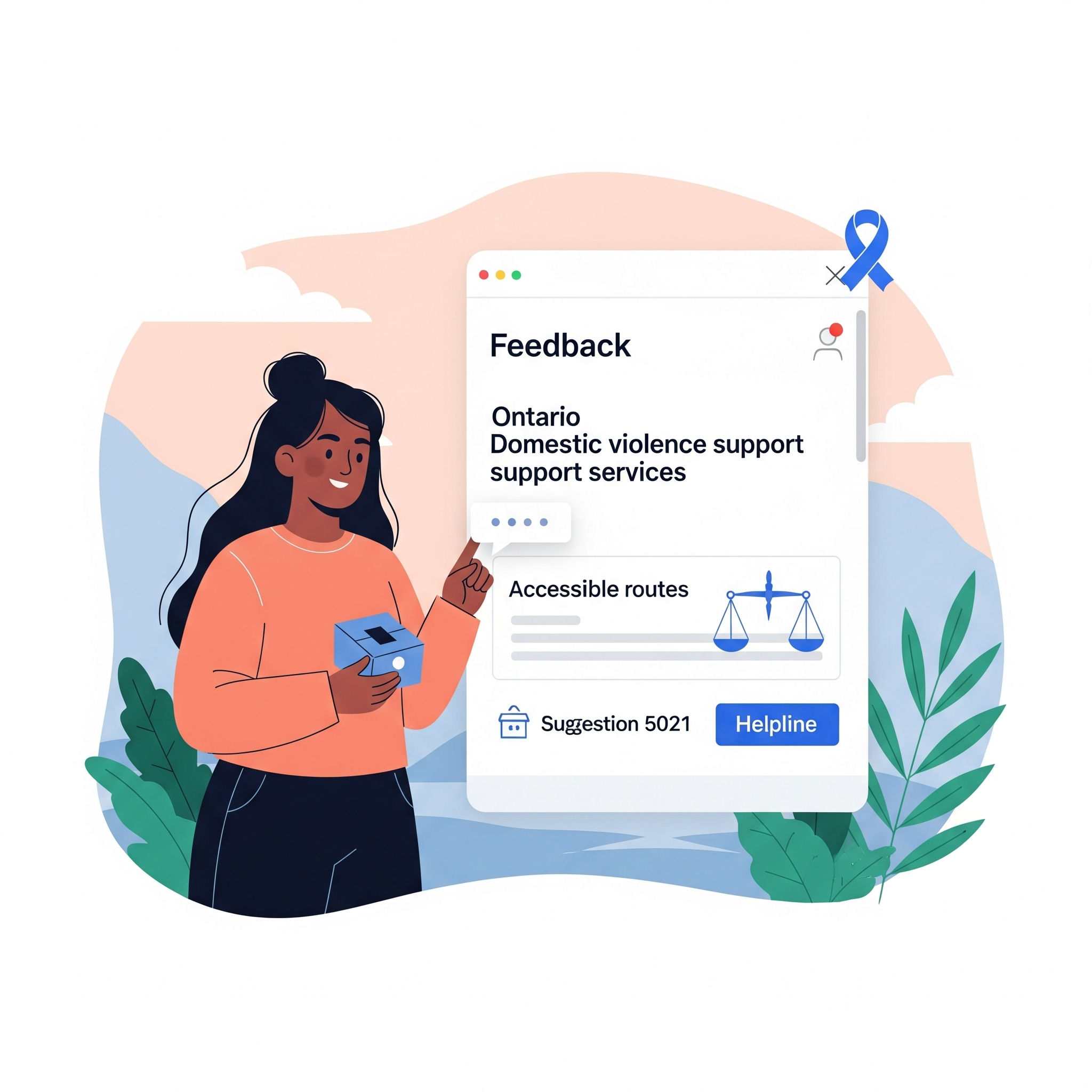How to Provide Feedback or Make Complaints About Services for DV Survivors in Ontario
Not every support system works the way it should. If a shelter, legal aid, police, or court system failed you, this guide helps you safely voice your concerns and advocate for change in Ontario.

Sometimes, domestic violence survivors encounter **unfair treatment, harmful policies, or inadequate support** from services meant to help. Whether it's a shelter, police service, court, legal aid, or medical provider—you have the right to be heard.
This guide will help you file a **trauma-informed complaint** or provide **constructive feedback** safely and effectively in Ontario.
***
### 🚨 Common Situations That May Warrant a Complaint
* You were **dismissed or not believed** by police or staff
* A service provider was **disrespectful, discriminatory, or harmful**
* Your **accessibility, safety, or privacy needs were ignored**
* You were **denied help unfairly** (e.g., legal aid, shelter, health care)
* You were **forced to interact with your abuser** unnecessarily
* You were denied service because of **gender identity, race, disability, or status**
> You do **not** need to be in a legal case to file a complaint or give feedback.
***
### ✅ Before You File a Complaint
* Write down **dates, names, and details** of what happened
* Save **emails, messages, or records** that support your concern
* Consider whether you want to file **anonymously or openly**
* If you’re still at risk, talk to an **advocate or legal worker** first
* Identify what outcome you want: an apology, policy change, compensation, etc.
***
### 📍 How to Complain to Common DV-Related Services in Ontario
#### 🛏 Domestic Violence Shelter or Support Worker
* Ask for the **shelter’s complaint policy**
* You can file a written complaint to the **Executive Director or Board**
* If unresolved, contact the funder (e.g., Ministry of Children, Community and Social Services)
#### 👮 Police Services
* Each Ontario police force has a **Professional Standards Unit**
* For Ontario Provincial Police (OPP), visit: [opp.ca](https://www.opp.ca/)
* You may also contact the **Ontario Civilian Police Commission (OCPC)**
#### ⚖️ Legal Aid Ontario
* Call 1-800-668-8258 or file online: [legalaid.on.ca](https://www.legalaid.on.ca/)
* Complaints are reviewed by a dedicated team and can be escalated
#### 🏛️ Family or Criminal Court Issues
* You may file complaints about **court accessibility, bias, or procedural misconduct** with:
* **Ontario Judicial Council** (for judges)
* **Ministry of the Attorney General** (for court services)
#### 🧠 Medical or Mental Health Providers
* Report to the **College of Physicians and Surgeons of Ontario (CPSO)**
* For therapists or social workers, contact their **professional college**
#### ♿ Accessibility or Discrimination
* File a human rights complaint with the **Human Rights Tribunal of Ontario (HRTO)**
* Contact **ARCH Disability Law Centre** or **DAWN Canada** for help
***
### 💡 Tips for Giving Feedback Safely
* Use **neutral language** if you want policy change, not blame
* Ask for a **trauma-informed or culturally safe review**
* If uncomfortable writing the complaint, ask a **support worker to help**
* Follow up if you don’t hear back within 30 days
* You can always share your story anonymously via **advocacy groups or media** (when safe)
***
### 📌 Summary: You Have the Right to Speak Up
* ✅ Survivors deserve respect and quality care from every system
* ✅ Filing a complaint is **your right**, not retaliation
* ✅ Support is available to help you navigate the process
* ✅ Feedback helps improve the system for others too
* ✅ Even small voices can lead to big change
***
### 📞 Ontario Resources for Complaint Help
* **211 Ontario** – Dial 2-1-1 for referrals to legal and complaints support
* **Barbra Schlifer Commemorative Clinic** – Legal support and advocacy
* **ARCH Disability Law Centre** – Complaints for accessibility or disability discrimination
* **Assaulted Women’s Helpline** – 1-866-863-0511
* **Ontario Human Rights Tribunal** – [tribunalsontario.ca/hrto](https://tribunalsontario.ca/hrto)
***
